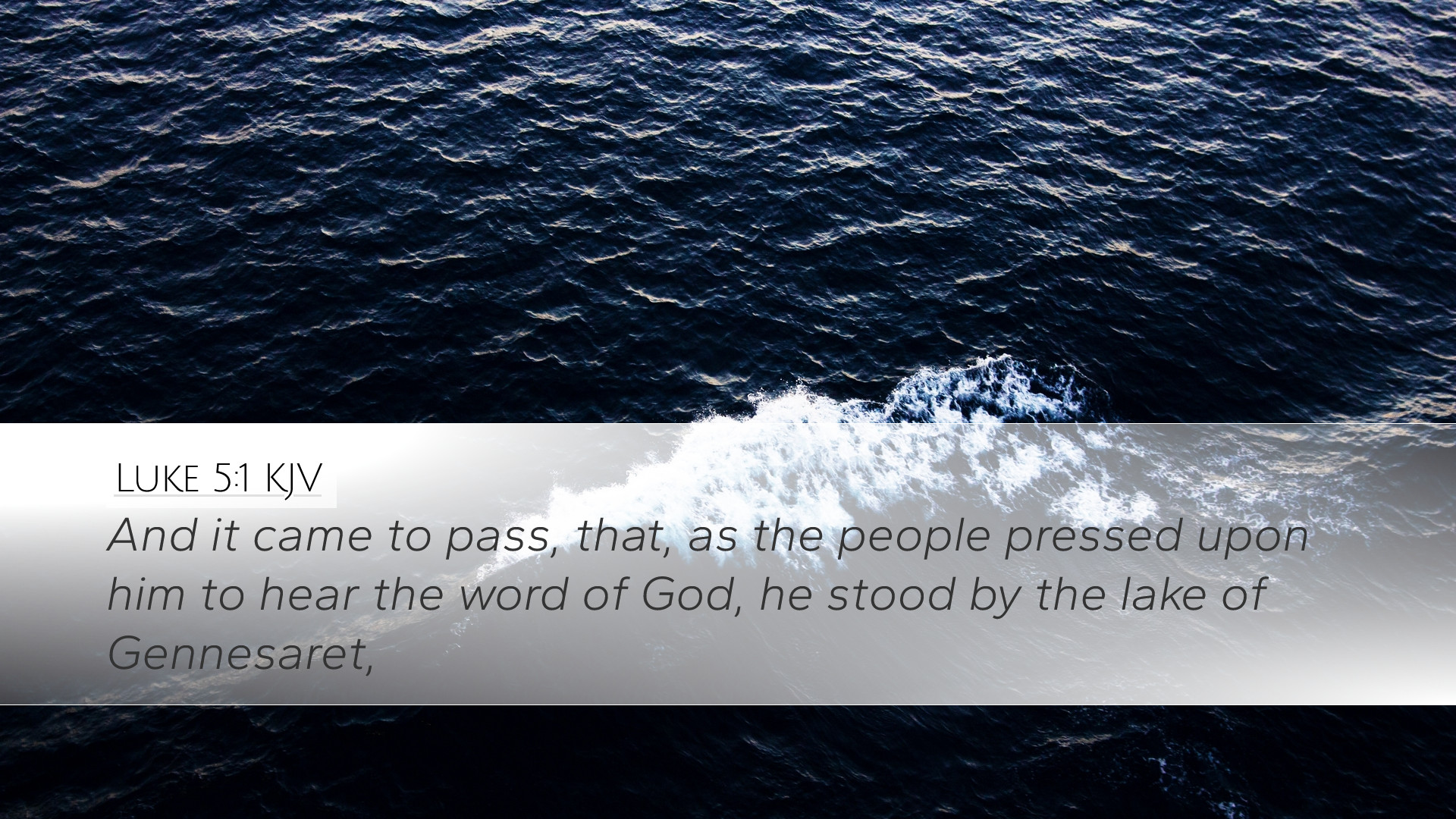Commentary on Luke 5:1
Luke 5:1 states: "And it came to pass, that, as the people pressed upon him to hear the word of God, he stood by the lake of Gennesaret."
Contextual Background
This moment occurs early in Jesus' ministry, amidst growing public interest and anticipation regarding His teachings and miracles. The setting at the Lake of Gennesaret (also known as the Sea of Galilee) is significant as it represents a vital area of Jesus' earthly ministry. The multitude's eagerness reflects a deep spiritual hunger for the truth and the teachings of Christ.
Exegesis and Insights
Public Eagerness for the Word of God
The phrase "pressed upon him to hear the word of God" indicates a profound desire among the people to receive spiritual nourishment. This eagerness is noted by various commentators:
-
Matthew Henry emphasizes this pressing desire as a reflection of the human need for divine revelation. He observes that people were not merely curious; they sought transformative instruction from Jesus.
-
Albert Barnes comments on the people's pressing nature, stating that they were drawn to Him not just out of curiosity, but in recognition of the authority and power in the words He spoke. There was an understanding that these words could lead to genuine spiritual awakening.
-
Adam Clarke adds that this scene illustrates the unquenched thirst for truth among the people, highlighting the contrast with the spiritual leaders of the day, who lacked a similar enthusiasm for God's word.
The Importance of Place
Jesus stands by the Lake of Gennesaret, a location rich in symbolism and activity. Commentators have noted:
-
Matthew Henry draws attention to the lake as a site for miracles and teaching, suggesting that its tranquil waters represent peace and the call of God inviting His followers to deeper faith.
-
Albert Barnes points out that the lakeside setting serves as a natural amphitheater, allowing Jesus to speak to large crowds effectively. This setting mirrors the idea that God often uses simple environments to deliver profound truths.
-
Adam Clarke reflects on the geographical significance, emphasizing that this locale was familiar to many of Jesus' future disciples, including fishermen like Peter. It sets the stage for their calling, bridging their everyday experiences with divine purpose.
The Call to Discipleship
The verse precedes the calling of Peter and his associates, which is pivotal for understanding the trajectory of their discipleship:
-
Matthew Henry posits that the attraction to Jesus and His teachings would soon lead to a personal call that demands a response. The pressing crowd foreshadows the commitment required of His chosen followers.
-
Albert Barnes notes that the encounter at the lake becomes a turning point not only for individuals but for the trajectory of Jesus' ministry as He begins to form His inner circle of disciples.
-
Adam Clarke emphasizes that this moment of listening and learning at the lake is essential in preparing the hearts of the disciples for the greater works they would undertake in service to the Gospel.
Theological Implications
Luke 5:1 introduces pivotal themes that resonate through Christian theology:
-
The Authority of Christ: The people's pressing need reveals the recognition of Jesus' unique authority, which is a foundational aspect of His identity as the Messiah.
-
Spiritual Hunger: The desire of the crowd reflects an innate spiritual longing present in humanity, urging pastors and theologians alike to consider how today's believers can also cultivate a yearning for God's word.
-
Preparation for Ministry: The setting and the actions occurring in this passage serve as a primer for understanding the nature of discipleship and its demands, urging a holistic approach in training future leaders of the Church.
Conclusion
In Luke 5:1, we find more than just a narrative of Jesus teaching by a lakeside; we discover a profound moment that encapsulates the call to discipleship, revealing both the heart of Jesus and the responsiveness of those seeking His word. The reflections offered by commentators such as Matthew Henry, Albert Barnes, and Adam Clarke illuminate the significance of this verse not only as a historical account but as a theological foundation for understanding our own call to faith and the mission of the Church.
As ministers, students, and scholars reflect upon this verse, they are invited to consider how the pressing need for God’s Word manifests today and how they can respond to the divine call for their own lives and ministries.


